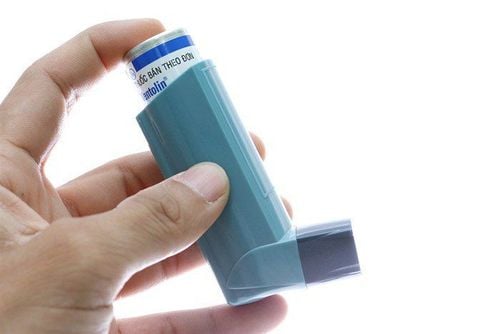This is an automatically translated article.
Bangren 5mg belongs to the group of prescription drugs, effective to help relieve symptoms in patients with seasonal allergic rhinitis. The drug is indicated for use in the prevention of symptoms of narrowing of the airways. To ensure effective use, users need to follow the instructions of their doctors, and refer to more information about the uses of Bangren in the following article.
1. What are the uses of Bangren?
1.1. What is Bangren 5mg? Bangren 5mg belongs to the group of pain relievers and antipyretics, non-steroidal anti-inflammatory drugs.
Drug Bangren 5mg used to treat Gout and bone diseases. The drug has the main ingredient Montelukast (in the form of Montelukast sodium) 5mg other active ingredients and excipients with just enough drug content provided by the manufacturer. Bangren drug is a product of TW MEDIPLANTEX Pharmaceutical Joint Stock Company, produced and circulated in Vietnam. The drug Bangren 5mg is registered with the registration number: VD-28176-17.
Bangren 5mg drug is prepared in the form of enteric-coated film-coated tablets, packing: Box of 3 blisters, each blister contains 10 film-coated tablets.
1.2. What does Bangren do? Bangren is prescribed by a specialist. The patient absolutely does not self-medicate. Bangren 5mg drug is indicated in the following cases:
As an adjunct to the treatment of chronic asthma in patients with moderate to mild asthma who have not responded well to inhaled corticosteroids therapy. Symptomatic relief in patients with seasonal allergic rhinitis. Prevent symptoms of narrowing of the airways caused by exercise. Contraindications of Bangren 5mg drug in case:
People with hypersensitivity to any of the ingredients or excipients of the drug.
2. Usage of Bangren
2.1. How to use Bangren Bangren is a tablet that should be taken orally. Patients should note taking the drug before meals and do not break or crush Bangren tablets.2.2. Dosage of the drug Bangren Dosage of the drug Bangren:
For children aged 15 years and older and adults: Take 1 tablet of 10mg/day or 2 tablets of 5mg. Children aged 6 to 14 years: Take 1 tablet of 5mg/day. A few notes when determining the dose of Bangren:
Patients should continue to take Bangren even if their asthma is under control and in more severe asthma episodes. In prophylactic treatment: It is necessary to evaluate the results after 2 to 4 weeks of treatment, if Bangren does not respond satisfactorily, it is necessary to consider additional treatment options, or other treatment options. In adjunctive therapy: Bloktiene should not be abruptly replaced with inhaled corticosteroids. To treat asthma, the patient should take the medicine in the evening. With allergic rhinitis, the duration of use of Bangren depends on the needs of each patient. For patients with both asthma and allergic rhinitis, it is recommended to take 1 tablet per day in the evening. Patients aged 15 years and older with asthma or allergic rhinitis: Take 1 10mg tablet or 2 5mg tablets per day. Children 6 to 14 years old with asthma or allergic rhinitis: Take 1 tablet of 5mg daily. Children 2 to 5 years old with asthma and/or allergic rhinitis: Take 1 tablet 4mg daily. Children from 6 months to 2 years old with asthma or perennial allergic rhinitis: Take 1 tablet 4mg daily. General recommendation:
The therapeutic effect of Bangren on asthma test parameters is achieved in 1 day. Patients should be advised to continue taking Bangren even though their asthma is under control as well as during periods of more severe asthma attacks. No dose adjustment is required for patients with mild and moderate renal or hepatic impairment or the elderly. Treatment related to other asthma medications:
Bangren can be used in combination with patients who are on other treatment regimens. Reduce dose of combination drugs: Bronchodilators, inhaled or oral corticosteroids. There should be no sudden change in inhaled or oral corticosteroids with Bangren as Montelukast. How to handle when missed dose, overdose of Montelukast:
In case of missed dose of Montelukast, it is advisable to supplement as soon as possible. However, if it is almost time for the next dose, skip the missed dose of Montelukast and use a new dose. When using an overdose of Montelukast, the patient should stop taking the drug immediately and go to the nearest medical facility for timely treatment.
3. Note when using Bangren
Bangren should not be used in the treatment of patients with acute asthma attacks. When treated with anti-asthmatic drugs containing montelukast, patients should be cautious of symptoms such as: eosinophilia, vasculitis, worsening of pulmonary symptoms, cardiac complications or bleeding present neurological disease. When these symptoms appear, it is necessary to re-evaluate the patient's treatment regimen. The safety and efficacy of Bangren treatment in patients younger than 2 years of age have not been established. The drug contains Aspartame, so it may be harmful to patients with phenylketouria. Patients with signs of galactose intolerance or Lapp lactase deficiency and glucose-galactose malabsorption should not use Montelukast. For pregnant women: It is not known whether Bangren affects the fetus or not. Therefore, pregnant women should only use Bangren when absolutely necessary and under the guidance of a specialist. During the course of taking Bangren, if you become pregnant, you should notify your treating doctor for appropriate treatment. For breast-feeding women: Bangren can be passed on to babies through breast-feeding. It is best not to use or limit the use of Bangren during breastfeeding. Many drugs have not yet fully determined their effects on this period. Therefore, mothers need to carefully read the instructions for use of the drug, consult with the doctor, pharmacist before deciding to take the medicine. Bangren does not impair the patient's ability to drive or use machines. However, in some cases, Bangren may cause drowsiness or dizziness. Therefore, when using Bangren, patients need to pay special attention and be more careful when performing these activities.
4. Side effects of the drug Bangren
At therapeutic doses, the drug is well tolerated. However, the process of using Bangren, patients may still experience side effects such as:
Nervous system disorders: Headache. Stomach and intestinal disorders: Abdominal pain, diarrhea, dry mouth, dyspepsia, nausea and vomiting. Blood and lymphatic system disorders: Increased bleeding. Immune system disorders: Hypersensitivity reactions including anaphylaxis or eosinophilic infiltration of the liver. Psychiatric Disorders: Nightmares, or hallucinations, insomnia, or irritability, anxiety, and hyperactivity, agitation including aggressive behavior, tremors, and depression. Nervous system disorders: Dizziness, somnolence, paresthesia, hypoesthesia and seizures. Cardiac disorders: Anxiety. Respiratory, thoracic and mediastinal disorders: Nosebleeds. Hepatic and biliary disorders: Elevated serum transaminase levels or cholestatic hepatitis. Skin and subcutaneous tissue disorders: Angioedema, bruising, urticaria, pruritus, rash or erythema nodosum. Musculoskeletal system disorders: Arthralgia, myalgia including cramps. Systemic disorders and disorders at the site of use: Asthenia, fatigue, malaise or edema and fever. If you experience these symptoms, the patient should stop using Bangren and notify the doctor for appropriate treatment.
5. Bangren drug interactions
Because Bangren is metabolised by CYP3A4, caution should be exercised when co-administered with CYP3A4 inducers such as: Phenytoin Phenobarbital and Rifampicin. Bangren can be used together with other commonly used drugs for the prevention and treatment of chronic asthma. Bangren did not have a significant effect on the pharmacokinetics of the following drugs: Theophylline, Prednisone, Prednisolone, oral contraceptives (Ethinyl estradiol/norethindrone 35/1), Terfenadine, Digoxin and Warfarin.
6. How to store Bangren
The shelf life of Bangren medicine is 36 months from the date of manufacture. Store Bangren in a cool, dry place, at a temperature not exceeding 30°C, in its original packaging and protected from light. Keep Bangren out of the reach of children and pets. Patients need to carefully read the information on the storage of Bangren medicine listed on the packaging and instructions for use. Check the expiry date of Bangren before taking it. When not using Bangren, it should be collected and disposed of according to the instructions of the manufacturer or the person in charge of medicine.













